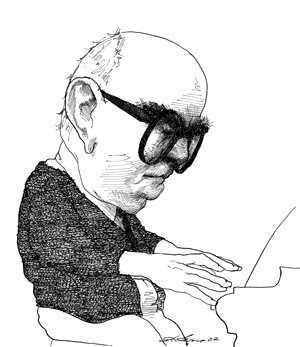To the Editors:
It is difficult to know where to begin detailing all the misrepresentations in which Charles Rosen indulges in his critique of Adorno [“Should We Adore Adorno?” NYR, October 24, 2002]; perhaps one could first separate them out from the empirically based criticisms with which they have been cannily interlarded. Of course Rosen is right to note Adorno’s unfairness to Haydn, as also his peculiar readings of individual works of Beethoven, especially the Missa Solemnis. But in a sense this is beside the point.
Philosophical criticism is, like literary criticism, notoriously unfair: if we read it for the essentially local and empirical insights of the connoisseur, we will get as little from it as Rosen does from Adorno. Eliot was egregiously unfair to Milton, as Auden was to Tennyson and Wordsworth; Nietzsche was polemically unfair not only to Wagner, but also to Brahms and Schumann. None of this prevents us from deriving pleasure and insight from this criticism today. (Some of Rosen’s own prose owes much of its own perdurability to its essayistic qualities, that is, to its partisanship and unfairness: one example might be Rosen’s dislike of Mahler.)
As to Adorno’s supposedly “clotted” style, this is poppycock, and all the more pernicious when addressed to an English- language public that cannot judge for itself, not always having had the benefit of the best translators. In fact, Adorno is, again like Nietzsche, a brilliant stylist in German, with a gift for rhetorical flourish, pithy epigram, and the ironic pointe, which is why he has been so often quoted outside academia. Günter Grass once wrote a poem ironically praising Adorno’s stylistic talent, titled “Adorno’s Tongue.” (Who are the unnamed “closest colleagues” of Adorno whom Rosen claims “could not understand his writing”?) One gets the best sense of this in his nonsystematic essays on culture and literature, many of which were delivered as talks on German radio—thus as political interventions in public debates. As Henry Pickford pointed out in the introduction to his recent translation of Adorno’s essays (Critical Models: Interventions and Catchwords, Columbia University Press, 1998), Adorno was a much more engaged intellectual than he was usually given credit for.
This last brings me to Rosen’s claim that Adorno was an elitist mandarin. This accusation was in fact most frequently used against Adorno by Stalinists like Georg Lukács, who was infuriated at Adorno’s continuing refusal to go along with Moscow directives. Moreover, a discomfort with the unreflected activism of the ’68ers was one shared by Jürgen Habermas, someone one can hardly accuse of political quietism.
Adorno’s public engagement could be illustrated by many examples, but one would be his response to the United States during his 1940s exile here. Unlike Brecht, Adorno was open to influences from his American milieu, and acknowledged this in his work (see the essay on “Scientific Experiences in America”). Rather than idealizing some supposed lost past, he repeatedly insisted that the past was not the paradise conservative restorers made it out to be (as in his essay “Bach Defended Against His Admirers”).
To lump Adorno together with French post-structuralism, as Rosen does, is an ahistorical caricature. In Germany, the 1980s reception of post-structuralism defined itself as a rebellion against Adorno’s idea of the ultimately moral role of art. Yet by the 1990s, the fad of the “post” had faded and a renewed interest in Adorno began to make itself felt. To give some idea of how scholars are now using Adorno’s ideas to investigate areas he himself would have scorned, I might mention James Buhler’s recent book on film music (Music and Cinema, edited by James Buhler, Caryl Flinn, and David Neumeyer, Wesleyan University Press, 2000), or a number of recent German publications which productively reconsider Adorno’s Wagner book (Richard Klein, C.-S. Mahnkopf). In many cases, these rereadings take issue with Adorno’s own views of particular artworks as much as does Rosen, while still recognizing the analytical usefulness of Adornian concepts. This sort of “heretical” reinterpretation is of course the best way for a philosopher’s thought to be kept alive and open.
Dr. Larson Powell
Department of Modern and Classical Languages
Texas A&M University
College Station, Texas
To the Editors:
As an admirer of the work of Charles Rosen I feel obliged to make some remarks about his review article about T.W. Adorno. Rosen certainly is right in correcting the one-sidedness of some of Adorno’s critical views, for example his amazingly inadequate view of the work of Haydn. But at a certain point Rosen seems to be carried away by his critical furor. He reproaches Adorno as being guilty of “cultural racism.” He is said to have propagated “the incapacity of the Slav to achieve subjectivity.”
Adorno never wrote or said anything like that. And it does not follow from what Rosen brings forth to support his reading. In his footnote to The Philosophy of Modern Music, which Rosen comments upon, Adorno establishes a relationship—problematic, it has to be admitted—between the supposed “premodern” and “precapitalistic” character of Russian society and some “traits” of a presumed “pre”-subjectivism‚ in the work of Mussorgsky and Dostoevsky (Adorno admired both). That the category of (modern) “subjectivity” was not yet firmly established in Russia may be a correct or incorrect statement, but certainly does not mean that Slavic people are incapable of subjectivity.
It is obvious that Adorno writes out of a strong identification with the middle-European musical tradition (excluding Bruckner and Wagner from it because of their presumed tendency to what Adorno calls “spatialization” of musical time, a tendency which forms the main target of Adorno’s attack on Stravinsky, Debussy (whose ballet Jeux Adorno always admired), and—we should not forget this—of Webern and Schoenberg as well). But Adorno’s sympathy with the Austrian-German ideal of “subjective” expression (and thematic development) does not prevent him from seeing the limitations of this “subjectivist approach.” He even maintained that the antisubjectivist attitude of Stravinsky was less ideological and more “true” (at least to some extent) than the “naive” subjectivism of the Schoenberg school.
That in The Philosophy of Modern Music Adorno, who later withdrew important parts of his critique of Schoenberg and Stravinsky, concentrates mainly only on two protagonists of modern music may seem odd; but one should realize that Adorno wrote this book as an excursus to his and Horkheimer’s Dialectic of Enlightenment, which may explain its abstract character.
And finally: Was Adorno as a composer even a greater amateur than Nietzsche was? Adorno’s Two Movements for String Quartet (which Berg did appreciate) are certainly more professional than anything Nietzsche was able to compose.
Thomas Baumeister
Department of Philosophy
University of Nijmegen
Nijmegen, The Netherlands
Charles Rosen replies:
I have not reproached Adorno for being an intellectual mandarin, as Professor Powell claims, but for his describing every concession to popular culture as a sign of cultural decline, and for his inability to recognize the elite and even mandarin element in contemporary jazz and the cinema. My main charge was that Adorno’s analysis of contemporary culture was largely a parochial lament for the loss of prestige of the educated upper middle class of Central Europe. This is too narrow a viewpoint to be generally serviceable.
Who were the unnamed colleagues who often found Adorno’s style opaque? “Herbert Marcuse once confessed in an interview that there were many things in Adorno’s writing that he didn’t understand.” (Theodor W. Adorno, Essays on Music, from the introduction by Richard Leppert, p. 67.) However, I have said, too, that Adorno achieved effects with his prose unattainable by a more pellucid manner, and have acknowledged its attractions.
Do I hate Mahler? The only references to Mahler in what I have written are:
The folk elements in Mahler—Ländler rhythms and turns of phrase now even more urban than pastoral—are deliberately left unassimilated, unfused with the strikingly advanced orchestral style in which they are embedded. It is their unmitigated banality—vulgarity, even—upon which so much of the tragic irony in Mahler depends.
(The Classical Style: Haydn, Mozart, Beethoven, p. 332)
For the rest, the classical tradition could be used with originality only through irony—the irony of Mahler, for example, who employed sonata-forms with the same mock respect that he gave to his shopworn scraps of dance-tunes.
(The Classical Style, p. 460)
These passages surely imply a profound appreciation of Mahler: to misread them as signifying hatred is not only absurd but perverse.
Equally puzzling is Professor Powell’s affirmation that I “lump Adorno together with French post-structuralism.” Astonished by this charge, I have been forced to read through my article carefully but have found no mention of French post-structuralism, or, indeed, of any post-structuralist or of any French critic.
Professor Baumeister is considerably more judicious and much more fair than I was in elucidating Adorno’s concept of subjectivity. Adorno characterizes subjectivity as a creation of bourgeois society, but his use of the terms “bourgeois” and “subjective” is so fluid and imprecise that many of the generalizations are suspect. This is not the place, however, to go into the problems of a terminology which would deny full (modern) subjectivity to medieval and Renaissance thought and to the Slavic cultures, or which evades any discussion of the relation between modern Western subjectivity and the subjectivity of the past or of distant spaces. Adorno used the concept not as a means of understanding but as a polemical weapon.
To claim about Petrouchka, as Adorno does, “that the Russian element in Stravinsky is to be sought” in the way he “escapes from his own ego, seeking happiness in that unarticulated mob” reveals the cloven hoof of the Central European’s contempt for the lands to the east (Philosophy of Modern Music, p. 144). It does not seem to me too strong to call this “cultural racism.” Adorno’s sense of shame led him to hide part of this statement in a footnote. Nevertheless, he passes the limits of shame when he declares in the text (p. 143) that in Petrouchka the music tends to take the part of those who ridicule the maltreated hero, rather than come to his defense.
Adorno’s treatment of Petrouchka largely dismisses the second scene, which is the heart of the work, its most radical passage, and the original inspiration for the ballet. In this scene, the rage and the suffering of the puppet aspiring to life are portrayed with music that was perhaps the first complete revelation of Stravinsky’s genius, and which was to influence almost every composer that followed in the twentieth century. For a writer as sensitive to musical values as Adorno, the willful disregard of this scene is a critical failure that can only be explained as an evasion, a refusal to come to terms with the subject. In place of a genuine discussion of the way Stravinsky represents subjectivity struggling to come to the surface of the imprisoned sensibility of the puppet, Adorno offers statements that betray only prejudice. “Wherever the subjective element is encountered,” he writes, “it is depraved; it is sickeningly oversentimentalized or trodden to death” (Philosophy of Modern Music, p. 144). How this can be applied to the second scene, I cannot imagine. This is not criticism but malice.
Other correspondents have corrected mistakes in my article. Univ. Prof. Dr. Heinz Steinert has kindly pointed out that Adorno’s pen name was not Detlev Rottweiler, but Hektor Rottweiler (I do not know how I came to make this foolish error); and he observed that the Institute for Social Research was not, as so many people think, located in Greenwich Village, but at Columbia University. Professor Steinert also objected to my insistence that Adorno was influenced by Oswald Spengler, as he criticized Spengler harshly, but Spengler’s once immensely popular characterization of much of modern culture is very similar to many details of Adorno’s in both its vocabulary and its spirit of analysis.
This Issue
February 13, 2003




